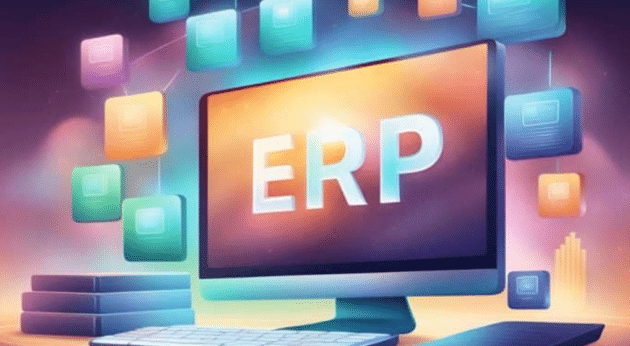Retail ERP Software: Transforming the Retail Landscape – In the fast-paced world of retail, where consumer preferences and market trends shift rapidly, businesses need efficient solutions to stay competitive. One key factor driving retail success is the integration of technology in managing business operations. This is where Retail ERP software (Enterprise Resource Planning) comes into play. By providing a centralized system for managing various aspects of retail, from inventory to customer service, Retail ERP software has become an indispensable tool for modern businesses.

What is Retail ERP Software?
Retail ERP software is a comprehensive, integrated platform designed to streamline and automate various retail business processes. It encompasses functionalities like inventory management, sales tracking, customer relationship management (CRM), accounting, supply chain management, and human resources. The goal of Retail ERP software is to bring all these functions under a single umbrella, thereby improving operational efficiency, reducing manual tasks, and enabling better decision-making.
Traditional retail operations often rely on disparate systems for different functions. For example, one system may handle inventory management, another may track sales, and yet another may be used for financial accounting. This siloed approach can lead to inefficiencies, data inconsistencies, and missed opportunities. Retail ERP software, on the other hand, integrates all these processes into a unified platform, providing a real-time view of the business and enabling seamless communication across departments.
Key Features of Retail ERP Software
Retail ERP software typically offers a range of features that cater specifically to the needs of retail businesses. These features include:
- Inventory Management: Retailers often deal with large volumes of inventory across multiple locations. ERP software helps manage inventory levels in real time, track stock movements, and forecast demand. It can also facilitate automated reordering, minimizing stockouts and overstock situations.
- Point of Sale (POS) Integration: Modern Retail ERP systems integrate with POS systems to provide real-time updates on sales data. This integration allows businesses to monitor sales performance, identify top-selling products, and adjust strategies based on current trends.
- Customer Relationship Management (CRM): Managing customer interactions and understanding customer behavior are crucial for retail success. Retail ERP software includes CRM capabilities that help retailers track customer preferences, purchase history, and feedback, enabling personalized marketing and better customer service.
- Financial Management: The software integrates financial processes, including accounting, payroll, and financial reporting. This ensures accurate and timely financial records, helping retailers stay on top of their financial health.
- Supply Chain Management: Retail ERP software streamlines supply chain operations by managing procurement, vendor relationships, and logistics. It provides visibility into the entire supply chain, ensuring timely delivery of goods and minimizing delays.
- Reporting and Analytics: Retail ERP systems come equipped with robust reporting and analytics tools. These tools allow retailers to generate customized reports on sales, inventory, financial performance, and customer behavior. Data-driven insights enable businesses to make informed decisions.
- Omnichannel Capabilities: In today’s retail environment, consumers interact with brands across multiple channels, including in-store, online, and mobile. Retail ERP software supports omnichannel operations by providing a unified view of customer data and inventory across all channels.
Benefits of Implementing Retail ERP Software
The implementation of Retail ERP software offers several significant benefits to retailers, helping them navigate challenges and capitalize on opportunities:
Improved Efficiency and Productivity
Retail ERP software automates manual processes, reducing the need for repetitive tasks and minimizing human errors. By streamlining operations such as inventory management, order processing, and accounting, employees can focus on more value-added tasks, thereby increasing productivity. For instance, automated inventory management ensures that stock levels are maintained at optimal levels without requiring constant manual intervention.
Enhanced Data Accuracy and Real-Time Insights
With all business processes integrated into a single system, data consistency is maintained across the organization. This centralized data repository provides real-time insights into business performance, enabling quick decision-making. Retailers can monitor sales trends, track customer preferences, and adjust inventory levels on the fly. For example, if a particular product is selling rapidly, retailers can swiftly reorder stock to meet demand.
Better Customer Experience
Retail ERP software helps improve the customer experience by providing a 360-degree view of customer interactions. Retailers can track customer purchase history, preferences, and feedback, allowing them to offer personalized recommendations and services. Moreover, with omnichannel capabilities, customers can enjoy a seamless shopping experience whether they shop in-store, online, or through mobile apps.
Cost Savings
The automation of business processes and improved efficiency lead to cost savings in several areas. For example, automated inventory management reduces the costs associated with excess stock or stockouts. Additionally, streamlined financial management ensures accurate financial reporting, reducing the risk of compliance-related penalties.
Scalability
As retail businesses grow, so do their operational needs. Retail ERP software is designed to be scalable, meaning it can accommodate increased transaction volumes, additional store locations, and expanded product lines. This scalability ensures that retailers can continue to use the same system as their business grows, avoiding the disruption associated with switching to a new system.
Regulatory Compliance
Retail businesses must adhere to various regulations, from tax laws to industry-specific requirements. Retail ERP software helps businesses stay compliant by automating tax calculations, generating necessary reports, and ensuring that financial records are accurate and up-to-date.
Challenges in Implementing Retail ERP Software
While the benefits of Retail ERP software are substantial, implementation can present challenges. Understanding these challenges is crucial for a successful ERP deployment:
High Initial Cost
The implementation of Retail ERP software involves a significant upfront investment. Costs include software licensing, hardware, data migration, and employee training. Small and mid-sized retailers may find the initial cost prohibitive. However, the long-term benefits often outweigh these initial expenses, as the system’s efficiency improvements lead to cost savings.
Customization and Integration
Retail businesses have unique requirements that may necessitate customization of the ERP software. Additionally, integrating the ERP system with existing software (e.g., POS systems, e-commerce platforms) can be complex. Customization and integration can increase the implementation timeline and cost, so careful planning is required.
Employee Training and Change Management
The transition to a new ERP system can be disruptive if employees are not adequately trained. Retail staff need to understand how to use the system effectively, and businesses should invest in training programs to ensure a smooth transition. Furthermore, change management strategies should be in place to address any resistance to new processes.
Data Migration
Migrating data from legacy systems to a new ERP platform is a critical step in the implementation process. This can be a time-consuming task, as data needs to be cleaned and formatted correctly before migration. Any errors during this phase can result in data loss or inconsistencies.
The Future of Retail ERP Software
The retail industry is undergoing rapid technological transformation, and Retail ERP software is evolving to keep pace with new trends. Some key future developments include:
Artificial Intelligence (AI) and Machine Learning (ML)
AI and ML are being integrated into Retail ERP software to enhance functionalities such as demand forecasting, customer analytics, and personalized marketing. These technologies can help retailers predict trends, optimize pricing strategies, and improve customer engagement.
Cloud-Based Solutions
Cloud-based Retail ERP solutions are becoming increasingly popular due to their flexibility, scalability, and cost-effectiveness. Cloud ERP systems allow retailers to access their data from anywhere, facilitate automatic software updates, and reduce the need for expensive on-premise infrastructure.
Internet of Things (IoT) Integration
The integration of IoT devices with Retail ERP software can provide retailers with real-time data on inventory levels, store traffic, and equipment performance. For example, IoT sensors can automatically update inventory levels in the ERP system when products are moved or sold.
Omnichannel Retailing
As consumer behavior shifts toward a seamless shopping experience across multiple channels, Retail ERP software is evolving to support omnichannel strategies. This includes real-time inventory visibility, unified customer data, and seamless order fulfillment across online and offline channels.
Conclusion
Retail ERP software is transforming the retail industry by providing businesses with the tools they need to streamline operations, improve customer experiences, and make data-driven decisions. While implementing an ERP system presents challenges, the benefits far outweigh the costs, especially when the software is tailored to the specific needs of a retail business. As technology continues to evolve, Retail ERP software will play a pivotal role in shaping the future of retail, enabling businesses to stay competitive and thrive in a dynamic marketplace.

